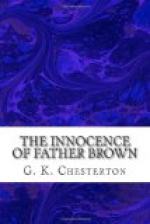“Because this is serious,” answered Brown; “this is not spilt snuff or loose pebbles, that might be there for a hundred reasons. There is only one reason I know of for this being done; and the reason goes down to the roots of the world. These religious pictures are not just dirtied or torn or scrawled over, which might be done in idleness or bigotry, by children or by Protestants. These have been treated very carefully—and very queerly. In every place where the great ornamented name of God comes in the old illuminations it has been elaborately taken out. The only other thing that has been removed is the halo round the head of the Child Jesus. Therefore, I say, let us get our warrant and our spade and our hatchet, and go up and break open that coffin.”
“What do you mean?” demanded the London officer.
“I mean,” answered the little priest, and his voice seemed to rise slightly in the roar of the gale. “I mean that the great devil of the universe may be sitting on the top tower of this castle at this moment, as big as a hundred elephants, and roaring like the Apocalypse. There is black magic somewhere at the bottom of this.”
“Black magic,” repeated Flambeau in a low voice, for he was too enlightened a man not to know of such things; “but what can these other things mean?”
“Oh, something damnable, I suppose,” replied Brown impatiently. “How should I know? How can I guess all their mazes down below? Perhaps you can make a torture out of snuff and bamboo. Perhaps lunatics lust after wax and steel filings. Perhaps there is a maddening drug made of lead pencils! Our shortest cut to the mystery is up the hill to the grave.”
His comrades hardly knew that they had obeyed and followed him till a blast of the night wind nearly flung them on their faces in the garden. Nevertheless they had obeyed him like automata; for Craven found a hatchet in his hand, and the warrant in his pocket; Flambeau was carrying the heavy spade of the strange gardener; Father Brown was carrying the little gilt book from which had been torn the name of God.
The path up the hill to the churchyard was crooked but short; only under that stress of wind it seemed laborious and long. Far as the eye could see, farther and farther as they mounted the slope, were seas beyond seas of pines, now all aslope one way under the wind. And that universal gesture seemed as vain as it was vast, as vain as if that wind were whistling about some unpeopled and purposeless planet. Through all that infinite growth of grey-blue forests sang, shrill and high, that ancient sorrow that is in the heart of all heathen things. One could fancy that the voices from the under world of unfathomable foliage were cries of the lost and wandering pagan gods: gods who had gone roaming in that irrational forest, and who will never find their way back to heaven.
“You see,” said Father Brown in low but easy tone, “Scotch people before Scotland existed were a curious lot. In fact, they’re a curious lot still. But in the prehistoric times I fancy they really worshipped demons. That,” he added genially, “is why they jumped at the Puritan theology.”




